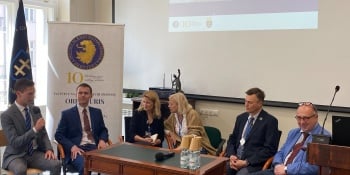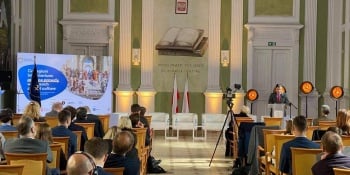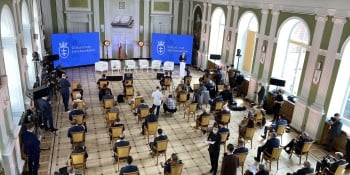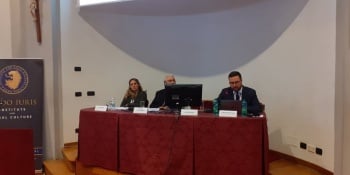
A scientific conference "The Phenomenon of Euthanasia. Interdisciplinary Reflections", co-organized by the Ordo Iuris Institute. During the event, the topic was analyzed from the perspective of medicine, law, sociology, philosophy or theology. Speakers presented, among other things, the legal status related to euthanasia in Poland and other European countries. They pointed out the problems raised by the spread of this procedure. Participants also drew attention to the most important measures to counteract the restriction of the right to life.
One of the speakers was Tomasz Dzierżanowski, MD, from the Medical University of Warsaw. The doctor focused on the issue of dying with dignity. He pointed out that human dignity is a fundamental issue in the discussion of dying. He also stressed that the dignity of both the dying patient and his loved ones and medical personnel should be respected.
- When we talk about dying, the starting point is the concept of human dignity. We understand it primarily as the concept of self-esteem, self-respect, but also the expectation that others express this respect towards us and recognize this dignity in us," Dr. Tomasz Dzierżanowski stressed.
Arkadiusz Robaczewski of Collegium Intermarium, meanwhile, noted that the popularization of hedonistic attitudes has influenced the spread of euthanasia. He pointed to the sources of our civilization to which a return could help curb euthanasia.
- It was obvious to ancient and medieval people that goodness is difficult, that life requires effort. To achieve one's goal, to achieve happiness, one must demand of oneself, generate effort. Such a belief was the result of reading the truth about the world and the truth about oneself in this world," noted Arkadiusz Robaczewski.
Lawyers also spoke at the event. Dr. Janusz Roszkiewicz of the Ombudsman's Office talked about the topic of the end of human life in the context of the law. He also introduced well-known cases that have moved public opinion in many countries - the cases of Vincent Lambert, Alfie Evans or Charlie Gard.
- The line between life and death is sometimes fluid. This is of fundamental importance from a lawyer's point of view, since the law does not contain a precise definition of death. Therefore, a lawyer must refer to the achievements of medicine, philosophy and sometimes theology to answer the question of whether he is dealing with a living human being whose life deserves legal protection," Dr. Roszkiewicz said.
Meanwhile, attorney Jerzy Kwaśniewski spoke about the constitutional role of the state and the community in the face of border states.
- In the Polish Constitution, we clearly see human dignity as a bridge that the legislator flips from the level of positive law to the level of supra-positive order and natural law. This rank of supra-positive order is essentially not questioned by anyone today," the president of Ordo Iuris noted.
Katarzyna Gęsiak referred to the issue of the spread of euthanasia in various European countries. She pointed out what trends accompany this phenomenon.
- Countries where euthanasia has been legalized are often adjacent to each other. We can see the strategy of how the right to euthanasia is spreading. It is an attempt to influence public opinion very strongly and to suggest that if a neighboring country has accepted euthanasia, we should do it too," the director of the Ordo Iuris Center for Medical Law and Bioethics stressed.

Collegium Intermarium has started its academic year. The inauguration ceremony took the form of an international conference attended by scholars, politicians and commentators from the US, France, Hungary, Croatia and Poland, among other countries. The guests included French politician Marion Maréchal, New York Post columnist Sohrab Ahmari, Prof. Adrian Vermuele from Harvard University, and former Speaker of the Sejm Dr Józef Zych. The conference is titled “Collegium Intermarium: a space for truth in the era of cancel culture”.

Representatives of state authorities, outstanding academics and journalists from Poland and abroad take part in the conference inaugurating the establishment of Collegium Intermarium. The goal of the new university is to create a platform of co-operation between academics from the Intermarium region. Its flagship field of specialisation is law, but it also offers a rich programme of postgraduate study courses.

An impediment to the realization of real women's rights is the frequent presentation of the concept in ideological ways. One of the most promoted directions in contemporary discourse to realize women's rights is the gender perspective. However, as it turns out, this concept raises a number of doubts, which stem from its strongly ideological nature and lack of effectiveness in real improvement of the situation of women in the world. The second in the series of conferences "In Defense of Women's Rights" was devoted to these issues.

There is currently a wide-ranging discussion on the concept of women's rights. The Ordo Iuris Institute organized the first in a series of debates on this issue. Two panels were devoted to presenting the political and doctrinal context of the issue of women's rights and women's right to health. The main premise of the conference was to address the issue of women's rights in an ideology-free manner.

The values which form the basis for law have a profound impact on modern Europe. This was the topic of the House on the Rock “Axiology of Law for the Europe of Tomorrow” Conference, which saw many prominent researchers engage in discussion in Rome. The event was organised by the Ordo Iuris Institute and the Pontifical University of St. Thomas Aquinas.

This year marks the 30th anniversary of the adoption of the Convention of the Rights of the Child by Poland.